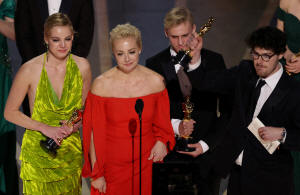Russia's Oscar-winning opposition is mired in conflict
 Send a link to a friend
Send a link to a friend
 [March 17, 2023]
By Mark Trevelyan and Andrew Osborn [March 17, 2023]
By Mark Trevelyan and Andrew Osborn
LONDON (Reuters) -Kremlin critics were cheered this week when a Western
documentary about jailed opposition politician Alexei Navalny won an
Oscar, but his political movement is in turmoil and some Ukrainian
politicians say the award is undeserved.
Navalny, President Vladimir Putin's most high-profile domestic critic,
is serving 11-1/2 years in jail in Russia after being convicted of fraud
in two cases he and the West say were trumped up to silence him, and his
anti-corruption organisation has been banned as extremist.
His supporters cast him as a Russian version of Nelson Mandela who
survived an assassination attempt and will one day be freed from unjust
imprisonment to lead Russia. The lawyer-turned-activist remains a fierce
Kremlin critic, releasing regular statements via his lawyers from behind
bars.
But his Anti-Corruption Foundation (ACF), which now operates outside
Russia, is reeling after his Chief of Staff Leonid Volkov admitted he
had - without his colleagues' knowledge - lobbied the European Union to
lift sanctions on Mikhail Fridman, one of Russia's richest men.
Volkov apologised for what he said was "a big political mistake" and
said he was taking a break from his role as chairman of the ACF.

Yet some fellow opposition members were furious, saying the ACF should
be trying to hasten Putin's political demise rather than helping wealthy
businessmen.
Vladimir Milov, a Navalny ally and a former deputy energy minister, said
some in the opposition had shown themselves to be "super-naive" in
seeking the lifting of sanctions on Fridman, whom he described as
Russia's "champion corporate raider".
"It inflicts colossal damage on the image of the Russian opposition,"
said Milov. "After this it will be necessary to restore the reputation
of the Russian opposition in the West."
TIT FOR TAT
The lobbying effort was made public in apparent revenge by Alexei
Venediktov, a prominent journalist who for years gave the opposition a
platform on the Moscow radio station he ran while maintaining ties with
the authorities.
Navalny's team had accused Venediktov of taking millions of dollars from
the Moscow city budget, which is controlled by a Putin ally, to publish
magazines. Venediktov admitted winning a publishing contract, but denied
wrongdoing or making a profit. Both he and Volkov were designated
"foreign agents" by Moscow in April 2022.
Leonid Nevzlin, a tycoon and prominent Israel-based Kremlin critic, said
on Twitter that the opposition needed to unite.
"While Ukraine is fighting for its freedom, the Russian oppositionists
have decided to open a second front... Unfortunately, not to fight
Putin, but to fight among themselves," he lamented.
Ksenia Thorstrom, an opposition politician from St Petersburg who has
now left Russia, said she too craved unity. "But unfortunately exactly
the opposite is happening at the moment," she said in a phone interview.

[to top of second column]
|

Yulia
Navalny, wife of jailed dissident Alexei Navalny, speaks next to her
daughter Daria and director Daniel Roher after "Navalny" was awarded
for Best Documentary Feature Film during the Oscars show at the 95th
Academy Awards in Hollywood, Los Angeles, California, U.S., March
12, 2023. REUTERS/Carlos Barria/File Photo
 SANDWICHES
The Oscar award also focused attention on Navalny's stance on
Crimea, the Black Sea peninsula which Russia annexed from Ukraine in
2014. That year, he said he did not think Crimea was a sandwich that
could be passed back and forth.
Navalny had long said he would hold an honest referendum asking
Crimea's residents which country they wanted to be part of if he
became president. Last month, however, he changed tack and said
Russia must respect Ukraine's 1991 borders.
Some Ukrainians were unconvinced, and shocked that the documentary
about him won the Oscar rather than a Ukrainian contender, a
co-production called "House of Splinters" - which tells the story of
an orphanage destroyed by Russian forces.
"Tonight proved once again that Russian propaganda works very well
and knows how to promote pseudo-heroes where there are no heroes,"
Azad Safarov, who helped make the Ukrainian co-production, said on
Facebook.
Andriy Sadovyi, the Mayor of the Ukrainian city of Lviv, recalled
Navalny's Crimea sandwich comments with distaste.
"Navalny is a sandwich packed in a lunch box carried around the
world as an example of the fact that there is still opposition in
Russia," Sadovyi wrote on Twitter, adding that it smelled of Russian
propaganda and now of the Oscar statuette.
Maria Snegovaya, senior fellow at the Center for Strategic and
International Studies, said the opposition in exile's messaging on
the Ukraine war was hobbled by fear of alienating supporters in
Russia, where anti-war feeling is not widespread.

"It's been a year, and yet the Russian opposition in exile remains
even more disunited and the infighting continues," she said in a
phone interview.
Navalny alluded obliquely to the conflict in a tweeted response to
the Oscar on Wednesday, hailing those around the world who "find the
strength to confront the monster of dictatorship and its constant
companion, war".
Nikita Yuferev, a Russian opposition municipal deputy now living
abroad, acknowledged disarray within the opposition but blamed a
20-year Kremlin crackdown. "It's headless, it's disoriented, but
there are objective reasons for that."
Navalny ally Milov said it would persevere.
"Problems and mistakes happen but we managed to survive the terrible
blow that Putin has been inflicting on us these last few years,"
Milov said on YouTube.
"We're not about to give up."
(Writing by Andrew Osborn; editing by Philippa Fletcher)
[© 2023 Thomson Reuters. All rights
reserved.] This material may not be published,
broadcast, rewritten or redistributed.
Thompson Reuters is solely responsible for this content. |